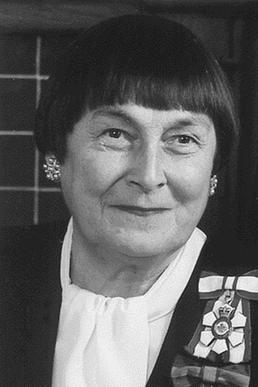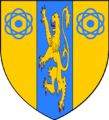Sylvia Fedoruk facts for kids
Quick facts for kids
Sylvia Fedoruk
OC SOM
|
|
|---|---|

Former Lieutenant Governor of Saskatchewan, the Honourable Sylvia Fedoruk wearing the insignia of the Order of Canada
|
|
| 17th Lieutenant Governor of Saskatchewan | |
| In office September 7, 1988 – May 31, 1994 |
|
| Monarch | Elizabeth II |
| Governor General | Jeanne Sauvé Ray Hnatyshyn |
| Premier | Grant Devine Roy Romanow |
| Preceded by | Frederick Johnson |
| Succeeded by | Jack Wiebe |
| Personal details | |
| Born | May 5, 1927 Canora, Saskatchewan |
| Died | September 26, 2012 (aged 85) Saskatoon, Saskatchewan |
| Nationality | Canadian |
| Alma mater | University of Saskatchewan |
| Occupation | Medical physicist, Physicist, Curler |
Sylvia Olga Fedoruk (born May 5, 1927 – died September 26, 2012) was an amazing Canadian woman. She was a physicist, a medical physicist (someone who uses physics in medicine), a curler, and even the Lieutenant Governor of Saskatchewan. She was the 17th person to hold this important job.
Contents
Sylvia Fedoruk's Life
Early Life and Education
Sylvia was born in Canora, Saskatchewan. Her parents, Annie Romaniuk and Theodore Fedoruk, were immigrants from Ukraine. She went to a one-room schoolhouse in Wroxton, Saskatchewan, where her father was her teacher.
During World War II, her family moved to Ontario. Her parents worked in factories that helped with the war effort. In 1946, Sylvia finished high school at Walkerville Collegiate in Windsor, Ontario. She was the top student in her class! She won a special medal and a scholarship to go to university.
However, her family decided to move back to Saskatchewan. So, Sylvia started studying at the University of Saskatchewan in Saskatoon in the fall of 1946.
She earned a Bachelor of Arts degree in physics in 1949. She was so good that she won the Governor General's Gold Medal. She then continued her studies and received her Master of Arts degree in physics in 1951.
A Pioneer in Science
After university, Sylvia was asked to work at the Saskatoon Cancer Clinic as a radiation physicist. She later became the chief medical physicist there. She also directed physics services for the Saskatchewan Cancer Clinic.
She was a professor at the University of Saskatchewan, teaching about cancer treatment (oncology) and physics. Sylvia helped create the world's first cobalt-60 unit. This machine, sometimes called the "cobalt bomb," was a huge step forward in treating cancer. It used targeted radiation to attack cancer cells. Sylvia's research on how radiation affects the body was key to making this machine work.
Sylvia was also the first woman to be a member of the Atomic Energy Control Board of Canada. This board makes sure that nuclear energy is used safely.
Leading the University
From 1986 to 1989, Sylvia was the chancellor of the University of Saskatchewan. This was a very important role, and she was the first woman to hold it at that university.
Curling Champion
Sylvia was also a talented curler! She was the president of the Canadian Ladies Curling Association from 1971 to 1972. In 1961, she played in the very first Diamond 'D' Championships (now known as the Scotties Tournament of Hearts). Her team from Saskatchewan won the tournament!
In 1986, she was honored for her contributions to curling and was added to the Canadian Curling Hall of Fame. She also received the Saskatchewan Order of Merit that year.
Lieutenant Governor
In 1987, Sylvia was made an Officer of the Order of Canada. This is one of the highest honors a Canadian can receive.
From 1988 to 1994, she served as the Lieutenant Governor of Saskatchewan. This role means she represented the Queen (now King) in the province. It's a very important job that involves many official duties.
Honoring Her Legacy
The City of Saskatoon named a road after her in the 1990s. It's called Fedoruk Drive.
On October 3, 2012, a special center was renamed in her honor. The Canadian Centre for Nuclear Innovation became the Sylvia Fedoruk Canadian Centre for Nuclear Innovation. This was to remember her groundbreaking work in using cobalt-60 radiation to treat cancer.
In 2009, Sylvia Fedoruk was inducted into the Canadian Medical Hall of Fame. This recognized her huge impact on medicine and science in Canada.
Images for kids
See also
 In Spanish: Sylvia Fedoruk para niños
In Spanish: Sylvia Fedoruk para niños
 | James Van Der Zee |
 | Alma Thomas |
 | Ellis Wilson |
 | Margaret Taylor-Burroughs |


